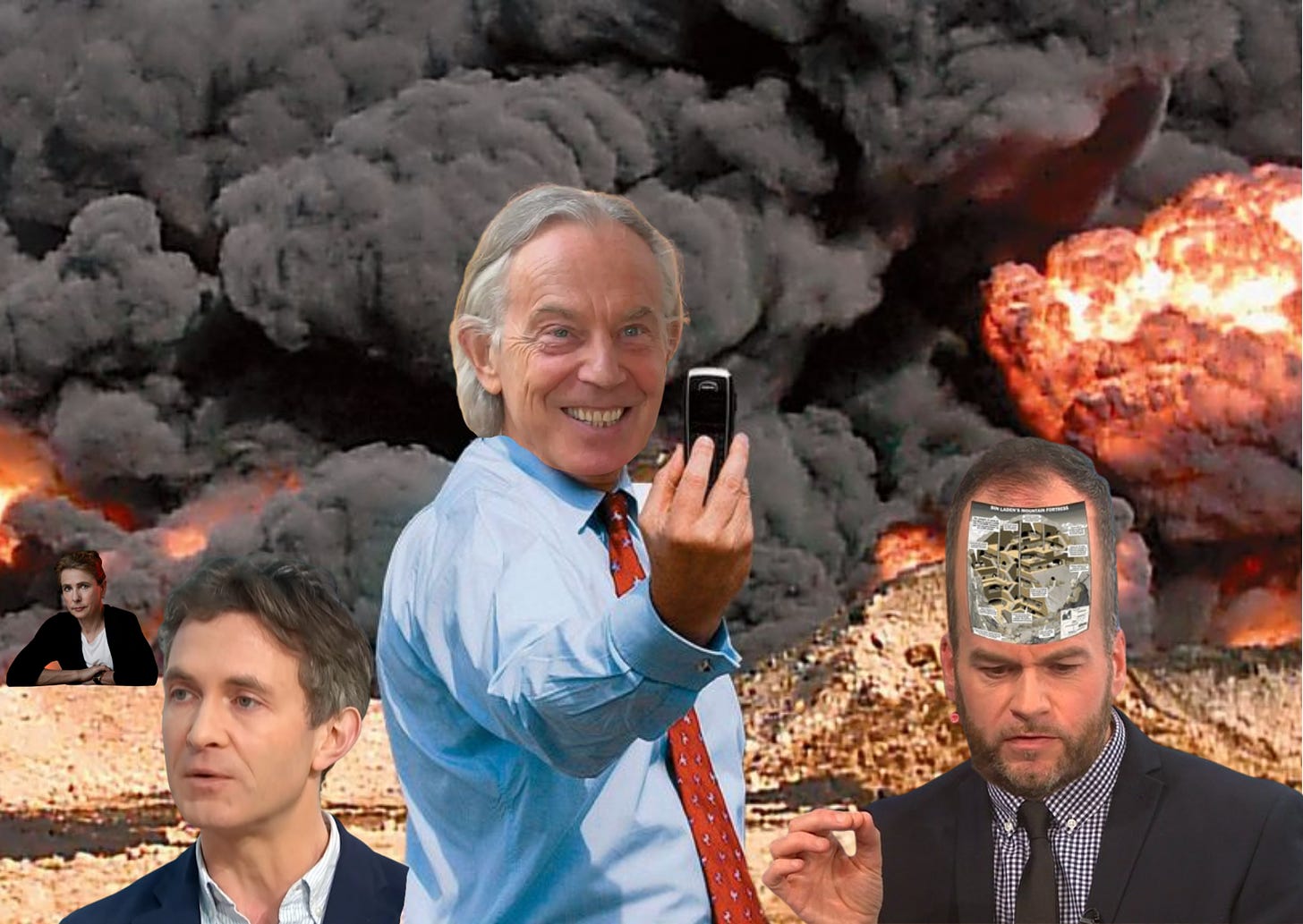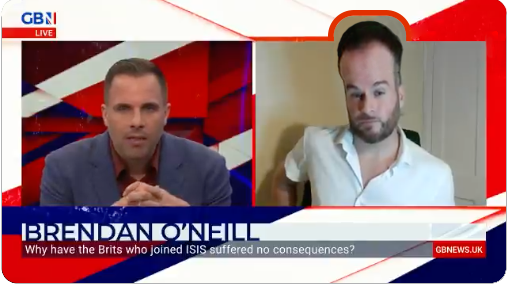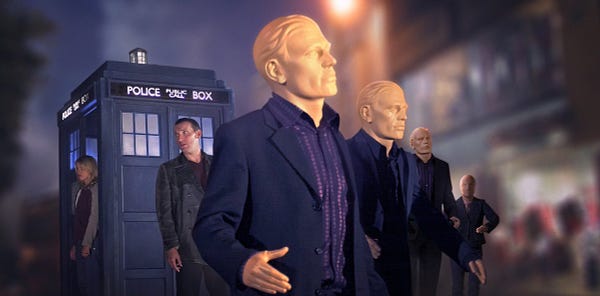Disturbed Dust: In a crowded field, Brendan O’Neill’s 9/11 20th anniversary take is the most unhinged…
… but Lionel Shriver, Dominic Sandbrook and Douglas Murray fight hard to be as crass and cracked.
The newspapers missed a major anniversary yesterday: 9 years since Danny Dyer tweeted:
Can’t believe it’s been nearly 11 years since them slags smashed into the twin towers it still freaks my nut out to this day…1
Since that auspicious day, we’ve discovered that Dyer — meeter and greeter of Britain’s Deadliest Men and father of Danni Dyer — is a descendent of Edward III. You would think would be enough to get him a column in The Daily Telegraph where proximity to aristocracy and a tendency to act like you’re suffering from a head injury usually guarantees a long career.
But no, instead of getting Danny Dyer’s considered thoughts on the legacy of 9/11, we’re forced to make do with dispatches from Douglas Murray — the Auton ambassador to Earth — perpetually-perplexed undercooked egg man and horrendous historian Douglas Sandbrook, Ulster Freedom Fighters fangirl and Spectator racist of the year Lionel Shriver, and Brendan O’Neill, a man so contrarian you could trick him into arguing passionately for his own execution.
In recent years, despite having accidentally met O’Neill on one occasion2, I have become convinced that he is, in fact, a long-running art installation created by the KLF to demonstrate the limits of stupidity. His 9/11 article for Spiked, the kingdom of contrarian dunderheads he rules with a forehead of iron, is the latest piece of evidence for that theory. Spiked’s tweet promoting the piece screams of Bill Drummond’s mischievous hand:
People forget just how “woke” al-Qaeda was. Bin Laden was an environmentalist, he believed in cancel culture, and he embraced the Islamist politics of victimhood. 9/11 was a hyper-violent form of identity politics, says Brendan O’Neill.
“Hitler was a vegetarian” is such an old cliché that The Residents used the phrase as a song title on their 1976 album The Third Reich ’n Roll. But Brendan O’Neill knows writers who abore cliché and they’re all cowards. If there’s any feasible or even infeasible way to weld the word ‘woke’ to a topic, O’Neill will do it. He’s the Evel Knievel of logic-defying rhetorical leaps.



O’Neill sets out his thesis at the end of the article’s first paragraph, driving at speed towards the cliff edge, whooping as he goes:
In many ways, bin Laden was as much a product of the West, and in particular of its politics of grievance, as he was its most feared terroristic enemy. His reign of terror can be seen as a violent manifestation of what has since come to be known as wokeness.
Whenever you see the phrase “In many ways…” in a comment piece you can be sure that what follows will be at best tenuous and at worst the ravings of a caffeine-addled maniac desperately trying to stand up a line as the word count taunts them. What we’re dealing with here is the latter, but Brendan’s going to take another 800 words or so dragging it out.
After tweeting last night about the piece, I got a few of the predictable tweets about how King Brendo had “triggered me”. But I don’t find O’Neill triggering or even funny. I find him tragic. He’s a pathetic figure who writes articles that live in a wasteland beyond parody in order to ensure invites to dance for appearance fees on Sky News and TalkRadio. His role in the British media eco-system is to push the boundaries of what insane things its permissible to say, making it easier for the ‘mainstream’ columnists to write ever more unhinged things.
A man who will, with a straight face and a towering forehead, write the sentence “His reign of terror can be seen as a violent manifestation of what has since come to be known as wokeness.” in reference to Osama Bin Laden will write anything. Words have ceased to hold their agreed meanings to this dadaist dickhead; reality bends before him, twisting always into a neon sign that screams “War on woke” and flashes forever in his blinking third eye.
O’Neill continues by professing confusion about what the September 11th attacks were “for” as if the brutal symbolism and reality were not self-evident:
… in reality, 9/11 lacked any of the tangible statements or sentiments of traditional forms of anti-Western terrorism. There were no demands, no list of complaints, no requests to release certain prisoners or to remove Western armies from certain countries. Indeed, the only audible statement made by an al-Qaeda operative on 9/11 itself was ‘We have some planes’.
Those words were uttered by Mohamed Atta, the chief hijacker, to air-control chiefs, shortly before he crashed American Airlines Flight 11 into the North Tower of the World Trade Center.
We have some planes. That was it. There was no information as to why they had those planes, why they crashed them into certain targets, what it was for.
From there, O’Neill returns to his attempts to persuade the reader that Bin Laden was “woke” and an extreme representation of "grievance culture”:
Bin Laden was an ideological magpie, always seeking the on-trend woke concern through which his desire to manifest his ‘intensely personal feelings’, to give voice or violence to his movement’s culture of grievance, might be most aptly and impactfully expressed.
He compares Bin Laden to Robert Fisk, Noam Chomsky and Michael Moore, “an ageing hippy”, and inevitably Extinction Rebellion. Context disappears in the rearview mirror once O’Neill is on a tear, so the fact that Bin Laden talked of “harmful gasses” and used the phrase “raise awareness” means that he’s indistinguishable from the environmental movement in Brendan’s bulging brain.
Despite — or perhaps because of — being a black belt in bad faith arguments, O’Neill chuckles “Hilariously, [Bin Laden] upbraided President George W Bush for ‘refus[ing] to sign the Kyoto Agreement.’” Only a truly galaxy brained commentator can take Bin Laden’s words at face value. O’Neill continues:
Bin Laden’s XR-style declarations, his imbibing of woke fears for the future of the planet, initially appeared incongruous. He kills thousands of people and then worries about the deaths of thousands of people in a future climate catastrophe?
There are a few things here: 1) It says a great deal about Brendan’s deep nihilism that he considers concerns about the future of the planet to be “woke fears” and 2) There’s no contradiction in Bin Laden wanting to kill thousands and wanting the planet to survive. Where would the caliphate go if there was no planet? The Al-Qaeda space programme never really… uh… took off.
O’Neill didn’t come up with these ideas himself either. He leans heavily on the theories of Dr Faisal Devji and, in particular, his book Landscapes of the Jihad: Militancy, Morality, Modernity. That’s where the notion of comparing Al Qaeda to environmentalism comes from and O’Neill quotes Devji several times in the piece.
He’s also reheating his own past pronouncements about 9/11 and Bin Laden. As well as directly quoting himself (“I have argued before that the two mass murderers who carried out the assault on Charlie Hebdo were essentially ‘the armed wing of political correctness’…”) the overall thrust of the latest article is something he’s been pushing for the past 15 years.


O’Neill first made the Bin Laden/Michael Moore comparison writing for Reason — rarely has a magazine been so inaccurately named — in January 2005, when he concluded that “Bin Laden [was] a blogger”. He claimed in The Spectator in April 2005 that Al Qaeda was “as middle-class as the Women’s Institute” before returning that August to claim that “in the 1990s Al-Qaeda became the armed wing of Western liberal opinion,”
In 2006, he wrote for Spiked that the 9/11 attacks were “a plea for attention” and “the logical outcome of today’s victim-orientated politics”. Earlier that year, he wondered for Slate whether modern terrorism could be blamed on gym culture (“Is there something about today’s preening and narcissistic gym culture that either nurtures terrorists or massages their self-delusions and desires?”).
For O’Neill, who will never attain the self-awareness to realise that his whole career is built on grievance and his own special flavour of identity politics, there is no issue that cannot be boiled down to “PC gone mad” or “wokeism”. So while it’s easy to argue that he is simply a contrarian, a look at the past 15 years of his output shows it’s a bit that he’s stuck to resolutely. At this point, he probably does believe it. His latest Spiked piece concludes:
Islamist nihilism is a species of identity politics in this sense. It is identitarianism turned apocalyptically violent. It is the West’s own self-loathing turned against the West, in bloody form.
… let us explore, honestly, how the regressive ideologies of identity, victimhood and censure mix with neo-fundamentalist Islamist dogma to give rise to forms of violence that threaten our lives and our liberties.
In Brendan O’Neill’s head, there is a direct line from people arguing that we should speak honestly about our history and that saying slurs is not ok to 9/11. If you could peek inside his brain you would see Charlie’s pinboard from It’s Always Sunny, a knotted chart of conspiracy in which every string traces back to a single word: “Woke”. This nightmare is very profitable for Brendan, why would he ever choose to wake up?
Despite his constant efforts and similar commitment to contrarianism, Dominic Sandbrook cannot reach O’Neill’s level. Still, he tries and his latest piece for The Daily Mail comes close. Beneath the headline What if 9/11 never happened? No Afghan or Iraq wars, no Brexit or Boris and no loss of the West's moral authority, Sandbrook delivers an alternate history as ludicrous as it is offensive.
In this fantasy world where the clear blue sky of 9/11 remained clear and blue, Sandbrook has Bush launching airstrikes against Afghanistan after attacks on US embassies in 2002 — the plans for the September 11 attacks that never happened are found in the remains of a destroyed terrorist camp — and backing a limited invasion of Iraq by exiles who fail. He’s voted out, like his dad, after one term. Al Gore replaces him, does a crap job in Sandbrook’s imagination, and is defeated at the next election by… Mike Huckabee. [Take a break here to laugh until your lungs hurt].
Curiously, Dom doesn’t give us any detail on the Huckabee administration. Instead, we jump across the Atlantic to find Tony Blair going on and on, sacking Gordon Brown in 2007, and leading Labour into the 2010 election where he ends up forming a Lib/Lab coalition after denying David Cameron victory by a handful of seats. The Tories replace Cameron with David Davis who beats David Miliband in the next election and holds an EU referendum that Remain wins (by 52-48). Davis resigns and despite the promise of the headline that there would be “no Boris”, Boris Johnson succeeds him as Prime Minister.
Things get even more unhinged as Sandbrook imagines Saddam Hussein, still leading Iraq aged 79, dispatches special forces to capture Osama Bin Laden. They bring him to Baghdad where he is executed (“Some say it was the septuagenarian Iraqi dictator, Saddam Hussein, who fired the fatal shot,” writes Sandbrook, perhaps drooling on himself).
Sandbrook’s imagined timeline ends there and the article falls into the kind of predictable, emotion-tweaking, fact-distorting, war-drumming analysis you’d expect from The Mail. As is common with alternate histories, Sandbrook is unable to imagine anything more than slight tweaks. Would Cameron really have been the Conservative leader in a world where 9/11 didn’t happen? Would Blair honestly have kept on going and been able to silence Brown? And who the fuck thinks Mike Huckabee would have been able to lumber into the Oval Office in any possible universe?


Over at The Daily Telegraph, Lionel Shriver takes a break from shovelling out racism for The Spectator, to centre herself in the story of September 11. She uses what a former editor of mine used to annoying call “the perpendicular pronoun” — I — 17 times in the first six paragraphs of a piece that the headline claims is about “lessons that were wasted on us” but is, in fact, all about her.
She writes glibly:
For Jonathan and me, the infrastructure of our whole lives felt suddenly unmoored. Everything we took for granted as solid and durable was revealed as fragile and fleeting. The very floor of that apartment seemed to sway, as if we weren’t on the fifth storey of a sturdy century-old apartment block, but on a raft in the high seas.
I’ve never been so aware of living in history as it’s being made. I’ve never felt so foolish for having perceived “history” as in the past, and the present as static. Afghans would have been way ahead of me. Those folks know the true nature of the present: lithe, coiling and capricious, like a live, crackling electrical cable. The present can veer into the murderous on a dime.
Cheap sentiment mixed with the othering of Afghans; what an unappealing dish.
Like O’Neill, Shriver finds a way to make her 9/11 reminiscences a vehicle for the culture war arguments she usually fills her column with:
Twenty years later, the US is cleaved into vicious warring factions. The country is once more divided into red and blue states, and geographically we suffer more from political segregation than the racial kind. The Trump era heightened this undeclared civil war, through which the fact that Democrats and Republicans were citizens of [the same] nation seemed a mere technicality; both sets of antagonists carrying the same colour passport reduced to freakish coincidence.
The age of Trump turned these allegiances profoundly personal, too. Partisans dox the other side’s children online, harass foes in their homes, and scream at politicians just trying to have a quiet meal in a restaurant. More than we ever hated Al-Qaeda or Bin Laden, we hate each other.
That neat little button there — “More than we ever hated Al-Qaeda or Bin Laden, we hate each other…” — isn’t true, but it’s something that columnists need to believe is true. Right-wing newspapers — The Daily Telegraph especially — need their readers to feel scared and unmoored at all times. And if the enemy of 20 years ago is no longer doing it, there’s the ‘woke’ to worry about.
The grim excesses of Shriver’s ‘shock’ tactics will come as no surprise to anyone who’s read her (or this newsletter before) but the conclusion to the latest column is quite something even for her. She writes:
However dreadful to contemplate, perhaps another assault on a similarly shocking scale would still stir the same grief, social cohesion and return to first principles. But in absence of such a kick-in-the-pants refresher, we’ve gone back to being petty, acrimonious, small-minded, myopic, self-involved and naïve. Whatever the lessons of 9/11, they were wasted on us.
Yes, Shriver thinks of 9/11 as a really extreme version of being made to eat your vegetables. And she doesn’t see that the “petty, acrimonious, small-minded, myopic, self-involved and naïve” description should not be applied generally but specifically to her and the rest of the columnist class.


And speaking of petty, acrimonious, and small-minded, we come to the final competitor in today’s most crass 9/11 column competition: Douglas Murray. Also writing in today’s edition of The Daily Telegraph, he contributes a piece with the headline Twenty years after 9/11, the Western world has tragically lost the will to win, and like Shriver and O’Neill uses the tragedy 20 years on as Rorschach inkblot in which he discovers proof of all the things he always says.
Murray opens his column with an anecdote, which he most likely got from the PBS Frontline series Return of The Taliban (2006), although he does not credit it:
Twenty years ago, just after the nature of the 9/11 attacks had been understood, America’s deputy secretary of state got hold of his counterparts in Pakistan. By the evening of the attacks, Richard Armitage, like other members of the administration in Washington, wanted to lay the new reality on the line.
Pakistan’s ambassador and the head of its intelligence services instantly tried to divert the conversation with a run of platitudes about the complexity of the situation and the historical issues that needed taking into account. Armitage snapped through the waffle. “History starts today,” he told them.3
After a dance through the events that followed 9/11 and his usual, habitual kicking leftwards, Murray finally concludes:
…like America in those days before 9/11, we will go back to thinking that history has gone away again. And we will wish it away again.
Until something happens to remind us that while history never starts today, nor does it ever stop.
It’s the tricky columnist’s use of “we” again. “We” did not all believe that history had gone away — whatever Francis Fukuyama insisted — a certain section of the political and foreign policy establishment believed that. Murray cannot even bring himself to note, as Shriver does, that history never stopped in Afghanistan.
But what he has in common with Shriver, his Telegraph and Spectator colleague, is the intention to terrify his reader. Every line is about implying that society is now dangerously decadent, seized by the woke, and in need of another war, another great trauma to, as Murray describes 9/11, act as “a great clarifier”.
Twenty years, thirty, forty, fifty years from now, we’ll be hearing the same monstrous myths from these same monstrous mouths. Imagine a row of jars filled with nutrient-rich liquid and inside them, O’Neill, Shriver, Murray and Sandbrook’s disembodied head chattered on, the sound of their words resolving to a single discordant line: “I was right, I was right, I was right.”
It still freaks my nut to this day.
FYI the restaurant had very high ceilings.
Here’s what Armitage, who was then Deputy Secretary of State in George W Bush’s administration, told PBS: “I literally then took him privately to my room and said: ... ‘No American will want to have anything to do with Pakistan in our moment of peril if you're not with us. It's black or white.’ And he wanted to tell me about history. He says, ‘You have to understand the history.’ And I said, ‘No, the history begins today.’"








